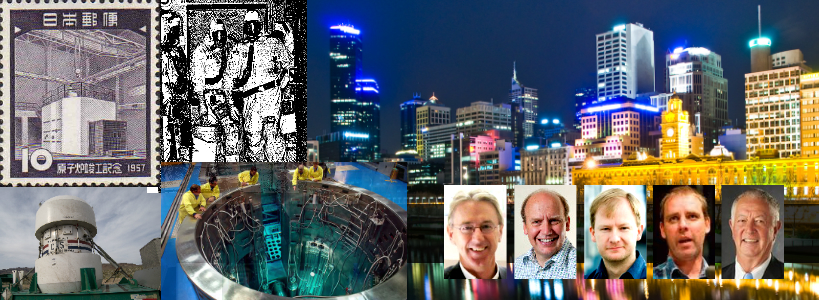Nuclear Energy: Should it be Included in the Mix? (Q & A Panel)

Join the Royal Society of Victoria as we confront the contentious issue of nuclear energy – the science and the politics – with an expert panel and audience Q & A session.
Highly contested as a safe, clean alternative to fossil fuels, nuclear power has seen its share of controversy and tragedy over the past half century with severe disasters at Three Mile Island, Chernobyl and Fukushima, along with a vigorous anti-nuclear lobby driven by the alarming proliferation of nuclear weapons across the globe. Harmful waste plutonium requires safe storage for up to 100,000 years, while perennial concerns for the weaponisation of nuclear fuels and waste abound. These factors raise serious questions for the long-term safety of nuclear power for many in the global community, particularly in unstable geological, climactic and political zones.
However, advancement in contemporary production technologies, reactor design and new capacities for reprocessing spent fuels leads many proponents to assert nuclear energy as a safe, clean energy option capable of replacing fossil fuel sources. Current standards and technologies for the use of uranium as a fuel, the reusage and storage of waste plutonium, and the relative safety of 3rd generation power plants commend the system for broader adoption to many in research, industry and government sectors. Meanwhile, “blue sky” thinking around the use of alternative fuels such as thorium is presented as a compelling alternative to the uranium cycle, with higher abundance on Earth, superior physical and nuclear fuel properties, reduced nuclear waste output and far lower potential for weaponisation.
Join a panel of experts, theorists, opponents and proponents to explore the current status of the science, the geopolitical landscape and the ethics of nuclear energy production through a robust discussion with the audience.
Chair:
Professor Doug MacFarlane
Austral ian Laureate Fellow, Monash University
ian Laureate Fellow, Monash University
Professor MacFarlane is an ARC Laureate Fellow at Monash University’s School of Chemistry. He is also the Energy Theme Leader in the Australian Centre of Excellence for Electromaterials Science, where his research group develops new materials for sustainable energy production and storage. He has published more than 550 papers and 30 patents. Professor MacFarlane was elected to the Australian Academy of Science in 2007 and to the Australian Academy of Technological Sciences and Engineering in 2009.
Panel Members:
Associate Professor Martin Sevior
Sc hool of Physics, University of Melbourne
hool of Physics, University of Melbourne
Dr Sevior’s PhD was in the field of nuclear physics, but he now undertakes research in the field of experimental particle physics. He has performed experiments with the world’s highest intensity and energy particle accelerators in Japan and at CERN in Switzerland. He became interested in nuclear power in 2005 after he was convinced mankind needed to develop large scale alternatives to fossil-fuel based power production. He formed a volunteer working group of PhD students, research associates and academics within the School of Physics to investigate nuclear power and its associated issues. The team put together a website at nuclearinfo.net to explain their findings. Since then, Martin has followed the technologies of power production as an informed outsider with no particular vested interest in a technology choice.
Dr Gavin Mudd
Course Director & Sen ior Lecturer, Environmental Engineering, Monash University
ior Lecturer, Environmental Engineering, Monash University
Dr Mudd has been involved in nuclear issues for nearly 20 years and is a recognised, independent global expert on uranium mining, especially environmental impacts, rehabilitation and life cycle assessment aspects. He has collaborated extensively with community and indigenous groups across Australia and internationally, providing an independent perspective on the scientific and engineering aspects of uranium mining. His work has been presented to parliamentary inquiries, government committees and numerous conferences in Australia and overseas, as well as in extensive journal papers. Dr Mudd is uniquely positioned to provide an independent technical perspective on splitting the environmental facts from the fission on uranium mining.
Dr Jim Green
National An ti-Nuclear Campaigner with Friends of the Earth Australia, Editor of the Nuclear Monitor Newsletter
ti-Nuclear Campaigner with Friends of the Earth Australia, Editor of the Nuclear Monitor Newsletter
Dr Green is a regular commentator on nuclear waste and the risks of low-dose radiation. He has qualifications in public health and authored a PhD thesis concerning the controversial HIFAR, Australia’s first nuclear reactor, commissioned at the Lucas Heights facility in 1958 and decommissioned in 2007, succeeded by OPAL as Australia’s only operating nuclear reactor. An active, anti-nuclear campaigner with Friends of the Earth, Dr Green is also editor of the Nuclear Monitor newsletter, published by the World Information Service on Energy.
Mr Graeme Weber
 Exploration Geologist (Retired)
Exploration Geologist (Retired)
Mr Weber stood as an Independent Candidate for the seat of Higgins in the last Federal Election, on a platform of introducing nuclear energy to Australia’s energy mix. On balance, he considers the costs, safety, reliability and stability of baseload electricity supply from modern nuclear energy production methods to be a convincing factor. With anthropogenic climate change requiring immediate action, Mr Weber considers the nuclear option to be the most viable for urgently replacing the baseload output of coal-fired generators.






